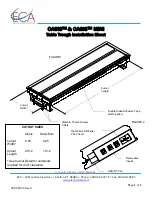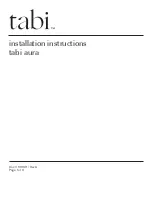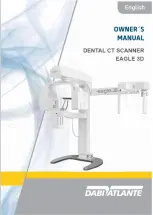
No. 2B771-447EN*F
265
Disinfection procedures
Perform the disinfection work according to the instructions of a disinfection
professional.
(a) Turn the system power OFF and disconnect the power cable plug from
the outlet of the facility.
(b) Wear protective gloves to prevent infection. Wear new sterile protective
gloves each time disinfection is performed.
(c) Be sure to perform cleaning before performing disinfection.
(d) Moisten a piece of soft cloth with a liquid chemical disinfectant, squeeze it
lightly, and wipe the surface of the unit. Be extremely careful not to allow
the detergent to enter the unit.
(e) After disinfection with chemicals, wipe the system with sterile or deionized
water to remove any residual disinfectant from the surface of the system.
Do not reuse the sterile or deionized water.
(f) Dry off the surface of the system using a piece of soft sterile cloth or
gauze.
Do not use heat to dry the system.
Confirm that there is no residual disinfectant. For detailed information
concerning handling of the disinfectant, refer to the manual provided with
the disinfectant.
To ensure that the disinfectant is effective, confirm the working
concentration, replacement interval, and temperature of the disinfectant.
To ensure that the disinfectant is effective, be sure to observe the use
criteria (such as the effective period, number of times to be used,
discoloration, and the results obtained using the effectiveness test kit)
described in the manual provided with the disinfectant.
(g) Confirm that the disinfected parts are not damaged or deformed.
(h) After disinfecting the system, ventilate the room fully before turning ON
the system.
NOTICE:
1. Do not leave the reference signal cable or ECG limb clips wet with
water or chemical solution. Incorrect display of ECG waveforms may
result.
2. Do not immerse the reference signal cable connector in water or
chemical solution. If moisture enters the connector, the system may
fail.
3. The PCG sensor and the pulse sensor are not waterproof. Do not
immerse the PCG sensor or the pulse sensor in water or chemical
solution.
4. Do not boil the ECG limb clips. They may be damaged.































